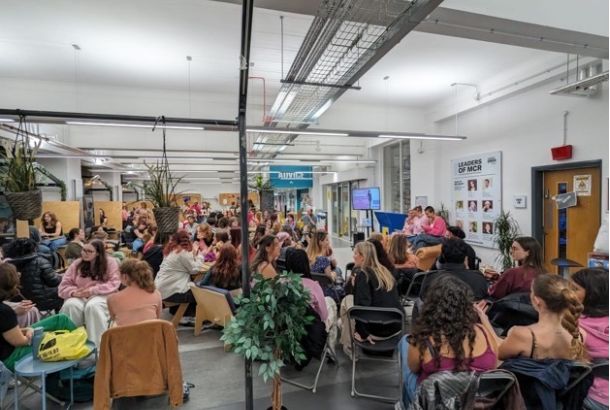A discussion on sustainable fashion: How can we be more sustainable?
By Sharon Lei

Why are sustainable fashion brands so expensive? Is the thrift industry size-ist? Could 3D body scanning be the answer to the hundreds of tonnes of textiles that are returned and thrown in landfills because they don’t fit?
Societies Editor, Sharon Lei recently attended a Zoom panel event hosted by Want Not Waste and The Closet on sustainable fashion, to find out the answers to all your sustainable fashion questions.
Want Not Waste is a student-run zero waste shop. The Closet is a student-led thrift shop, with all proceeds going to mental health charity Mind. Both shops are part of the Student’s Union at The University of Manchester. They provide a great way to raise environmental consciousness in the student community.
The event took place in the style of a panel. The speakers included an independent Depop seller, a fashion technology student with expertise in sustainable fashion design, and a sustainable lifestyle blogger. The event surrounded a central discussion on ethical consumerism, aiming to raise awareness of the problematic labour and practice seen in the fast fashion industry.
The growth of sustainable fashion has increased massively in recent years. Platforms like Depop, Vinted, Etsy, and Ebay allow people access to second hand, thrifted clothes more easily. However, the increase in popularity surrounding sustainable fashion has also lead to problems such as ‘greenwashing’. Cheap, mass-produced clothing is marketed as sustainable and conscious, misleading consumers with a lack of transparency and facts.
Problems with shopping second hand or thrifting
Thrifting and second-hand shopping is not a solution to solving the obsession with fast fashion. As one of the panellists pointed out, thrifting and second-hand shopping is often limited in size. This makes it completely unavailable for the plus-size community.
New fashion technology also helps to reduce fashion waste. The panel mentioned the 3D body scanning technology adopted by high street retailers such as M&S. They aim to improve the fit and sizing of their clothing in order to increase customer satisfaction and reduce return. Using data accumulation, companies are able to make garments that fit customers well, and are therefore less likely to be disposed of as quickly. The use of full garment fitting technology is also another way to reduce waste in fashion production; aiming to produce a full garment in one step, rather than going through the process of cutting fabrics and assembling the pieces together.
The impact of fast fashion on our planet
I was surprised and shocked by the amount of waste the fast fashion industry produces. The panel pointed out that there was a lot of unsold stock due to the coronavirus pandemic. The lockdown resulted in newly produced clothes disposed of in the landfill and companies refusing to pay workers. – creating harmful impacts on the environment.
The use of cotton in garment production also means a large amount of water is used to produce a small amount of material. 10,000 litres of water is require to produce 1kg of cotton requires 10,000 litres, creating waste at an unimaginable level.
The issue of microplastics in clothes were also raised. The use of polyester has a huge environmental impact, as microplastics are released into the ocean every time we do our laundry.
The Manchester Thrifting Society also pointed out that £140 million worth of clothing goes to the landfill every year in the UK alone, as well as £5 billion worth of returned clothes. Recent events, such as the PrettyLittleThing sale, where clothes were sold for as little as 5p, highlights the problematic nature of the fast fashion industry, and how items are not made to last; just to simply satisfy the season’s trend.
Why are sustainable brands/clothing so expensive?
This was an interesting topic raised in the discussion. Sustainable clothes are more expensive to produce due to their methods. But, it is also expensive in our eyes as we are used to buying cheap clothing; clothing that is unethical in its treatment of textile workers, and the conditions they work in. We are able to enjoy cheap clothing at the expense of textile workers. Sustainable clothing brands tend to pay their workers more, and are treated fairly, thus bringing the cost of production up. Many sustainable companies tend to be produced in smaller numbers, made to order or made to measure, making it more expensive to buy. Most are unable to be price competitive with mass-produced fast fashion.
How to be more conscious of your fashion consumption?
The online magazine Ethical Consumer is a great way for many to be further educated on the topic of sustainability and environmental consciousness. It gives information about each retailer’s transparency and sustainability to help consumers make more informed choices.
One of the event’s panellists, sustainable blogger Jenny, also has a blog focused on sustainability and conscious consumption.
The Manchester Thrift Society is also another great way to stay informed and get involved in the discussion. It is run by a group of passionate eco-friendly students. They have a Facebook group allowing you to swap clothes, shoes and accessories or buy for an affordable price. The society also runs upcycling Zoom workshops and events for its members. There is a £5 yearly membership fee upon joining, allowing their members to gain access to their events and discussions.
Check out the Manchester Thrifting Society through their SU Membership page, or on Instagram.







